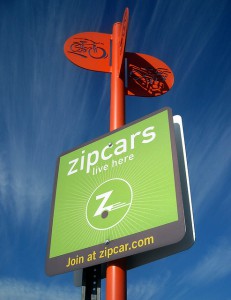Car sharing trends: Beyond Zipcar
Thirteen years after the innovative car sharing service Zipcar burst – er, drove – onto the scene, car sharing is undergoing a new revolution in the U.S.
While Zipcar was acquired for approximately $500 million by Avis Budget Group in March of this year, a fresh outcropping of car sharing companies and peer to peer sharing is gaining traction among drivers throughout the country. Taking advantage of a business model found to work for powerhouses like Airbnb, the home-sharing company, and the consumer’s increasing willingness to share, rather than own, auto travel hasn’t ever been as affordable or eco-friendly as it is today.
Boosted by Smartphone apps that help car sharers locate vehicles, plus competitive pricing by the hour and even minute, car sharing is changing the way drivers young and old travel.
Take FlighCar, a new car sharing startup. Eighteen-year-old Rujul Zaparde recently co-founded the service, which the Washington Post calls “Airbnb for airport rentals.” The concept is simple, and the funding is extraordinary: backed by $5.5 million thus far, FlightCar allows users to rent out their cars from the San Francisco International Airport while they are out of town. The service is next debuting at the Logan International Airport in Boston.

Preferential parking spots are one way to reward the efficiency and carbon savings that car shares bring. Sign via roadtrafficsigns.com.
Other peer to peer services, such as RelayRides, another car share startup that’s now available in all 50 states, offer car owners an added bonus: a chance to perhaps pay off the car in question. As Wired reports, the average car remains unused for 92 percent of the time. Meanwhile, the monthly cost of owning a car is over $230. What’s the payoff? A RelayRides user earns an average of $250 monthly by renting his or her car out for a few hours each week. Renters and rentees are vetted, and insurance, up to $1 million, is covered by the company.
For sharers looking to cash in on their coveted parking space or extra seats in their car, ParkingPanda allows users to rent out parking spots, while ride-sharing sites like ZimRide and Lyft.me help drivers fill extra seats – and earn some spare gas money while they’re at it.
Would-be drivers can decide what’s in the budget, then start downloading: Companies like GetAround offer inexpensive rentals on pricy cars, including Teslas and Porsche Cayennes, and even lower prices on budget-conscious options like Honda Accords, all through their mobile app. For quick jaunts around town, “smart cars” – compact cars that are popular in Europe and increasingly so in the States – are the go-to option of the day.

Car2go: another one of Zipcar’s surging competitors. Via atomictaco, licensed under Creative Commons.
In Austin, San Diego, Miami, Washington DC, Portland and Seattle – in addition to a collection of other, international cities – there’s car2go. Providing members with compact, energy-efficient cars and paid-for parking, car2go is a subscription-free and no-reservation service that charges users only for the time used. The charges are simple: In addition to a $35 sign-up fee, car2go charges $0.38 per minute; a max hourly fee of $13.99; and $72.99, at most, per day. Car2go allows member to pick up nearby cars, or book one 30 minutes in advance.
While sharing options as diverse as the cars on offer abound, there’s one common thread: each offers environment- and budget-friendly solutions for drivers and renters alike.
Category: Automotive, News & New Products



















Comments (1)
Sites That Link to this Post